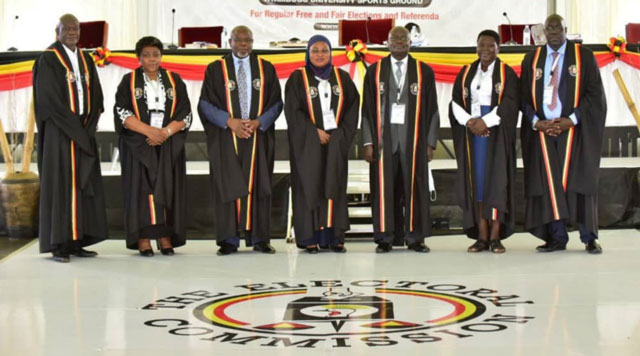
presidential candidates for the 2021 general elections on 02 November, 2020. COURTESY PHOTO
Restoring the EC’s image
Shortly after swearing-in as the new head of the Electoral Commission in January 2017, Simon Byabakama said his first priority was to regain the “already tainted image” of the electoral body by organizing free and fair elections.
Byabakama’s words, it appears, instigated interest in how he will perform. As he prepares to supervise his first general election in which over 1.5 million electoral positions must be filled in 146 districts, 80 municipalities, 353 counties, 2,190 sub-counties, 10,594 parishes and over 65000 villages, it appears Byabakama is under nationwide, if not global, scrutiny.
Byabakama’s words appear to have stung his predecessor, Badru Kiggundu, and it seems the elderly engineer is among those keenly watching his successor.
Kiggundu who was at the helm of three consecutive general elections, from 2006 to 2016, has over the last five years been heading the presidential select committee that has been supervising the completion of both Isimba and Karuma Hydroelectric Power Stations.
While speaking to the media on Jan.07 during the commissioning of the Isimba Bridge, an overpass that connects Kayunga District to Kamuli District across the Nile, Kiggundu said he is watching Byabakama and his team during the Jan.14 general election.
“Byabakama told the country that he had come in to correct what I had failed to do and I am on the look-out and cannot wait to engage with him after the elections,” Kiggundu said, “It is always easy to judge when you are on the outside.”
One-man showmanship
Byabakama is already being accused of one-man showmanship, bias, and being a President Museveni poodle. How he performs on general elections day (Jan. 14) will either reinforce or weaken these accusations. It will not erase them.
Crispin Kaheru, an election expert told The Independent on Jan.07 that managing an election is ordinarily no mean task.
“It is even harder to ensure effective delivery of one in today’s context with the challenges brought by COVID-19 but also amidst the various gaps in the legal and administrative framework of elections,” Kaheru told The Independent.
“I want to imagine Justice Byabakama has given the election his best shot. However, there are a number of challenges on the path of his first election; there has been inadequate space for consultation between the EC and other stakeholders in the process including political parties, candidates, CSOs among others.”
“This has meant delayed and piecemeal sharing of information. It has also meant that a number of decisions which would ideally or ordinarily be best made through a consultative process are instead made outside the process,” Kaheru said.
Not everyone is happy with how Byabakama has run the election so far.
Robert Ssentamu Kyagulanyi who is challenging President Museveni in the forthcoming presidential election has said the EC is using the COVID-19 pandemic as “an excuse to ban public rallies and other aspects of an election as we know them.”
When Uganda registered its first case of COVID-19 in March last year, the government immediately locked down most economic activity, including political activity. This left Byabakama without a clear path on how to proceed with the 2021 electoral roadmap which was already underway. The EC took three months, to June 16 last year, to issue new guidelines for what came to be known as “scientific elections” – a term borrowed from President Yoweri Museveni’s COVID-19 induced so-called “scientific weddings.’
While announcing the guidelines, Byabakama said he was following expert guidance from the Ministry of Health. He said the commission would issue specific guidelines for each electoral activity under revised roadmap.
Byabakama said the EC had engaged with several stakeholders and actors to agree on how best to drive the electoral process forward. He said campaigns were to be done in accordance with the measures and guidelines and standard operating procedures (SOPs) put in place by the Ministry of Health to prevent the spread of COVID-19, and the standard operating procedures issued by the EC to prevent and combat person-to-person, person-to-object and object-to-person spread of the COVID-19 during the conduct of election activities.
 The Independent Uganda: You get the Truth we Pay the Price
The Independent Uganda: You get the Truth we Pay the Price



